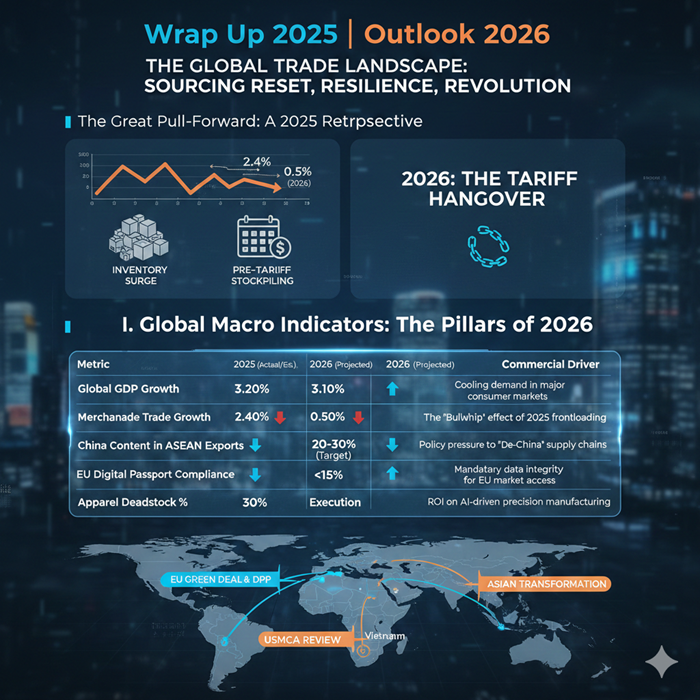“It’s the first time in history that key players from the industry have joined forces to discuss and agree on what to prioritise to improve the industry’s environmental and social footprint. It takes a coordinated effort to move the needle on sustainability, which is why this agenda for a common industry focus holds the potential to be a major breakthrough - Eva Kruse, CEO, Global Fashion Agenda”

The Global Fashion Agenda has released its first-ever CEO Agenda for the fashion industry. It spells out seven most crucial sustainability priorities for fashion CEOs in 2018. Developed in collaboration with leading fashion players including Kering, H&M, Target, Bestseller, Li & Fung and Sustainable Apparel Coalition, and building on the Pulse of the Fashion Industry 2017 report co-authored by Global Fashion Agenda and The Boston Consulting Group, the historic first edition offers clear guidance for company executives on where to focus their sustainability efforts. Eva Kruse, CEO, Global Fashion Agenda, said, “It’s the first time in history that key players from the industry have joined forces to discuss and agree on what to prioritise to improve the industry’s environmental and social footprint. It takes a coordinated effort to move the needle on sustainability, which is why this agenda for a common industry focus holds the potential to be a major breakthrough.”
The change agent

Employing 60 million people worldwide, the fashion industry generates €1.5 trillion in global revenue (apparel action is and footwear) but that value is at risk if no taken. In fact, projections from the Pulse of the Fashion Industry 2017 report show that fashion brands will see a decline in EBIT margins of more than three percentage points if they continue business as usual. Kruse commented, “Fashion is one of the largest industries in the world, but also one of the most resource and labour intensive. The environmental, social and ethical challenges the industry faces today are not only a threat to the planet, but also a threat to the industry itself. That's why there's no alternative but for sustainability to become an integral part of any company's business strategy.”
The CEO Agenda 2018 spells out seven priorities that should be top of mind for any CEO in fashion right now. Three priorities for immediate implementation include supply chain traceability; efficient use of water, energy and chemicals; respectful and secure work environments, etc. Apart from this, there are four transformational priorities for fundamental change in the long run. These include sustainable material mix; closed-loop fashion system; promotion of better wage systems; and fourth industrial revolution.
Industry voice
On the back of Agenda launch, Karl-Johan Persson, CEO, H&M, elaborated, “The big challenges facing the world can only be tackled by working together. This is a prerequisite for making the fashion industry part of the solution rather than part of the problem. Our collaborative mindset has, for example, helped us when setting the ambitious goal to become climate positive by 2040. This means we will go beyond minimising the negative consequences of our business to create a positive impact on the planet. But no matter if the challenges are about recycling innovation, new sustainable materials or working conditions for the people making our clothes, our collaboration with others is key to make lasting change.”
Amanda Nusz, VP & general merchandise manager, Target, added, “At Target, we know that the decisions we make have the potential to impact millions of people around the world, including the people who create our products and the communities where they live. We build responsible practices into our sourcing operations including public commitments to improving worker well-being, manufacturing in a way that enhances the environment and increasing our use of sustainable raw materials and have a longstanding commitment to transparency within our supply chain. As a Strategic Partner of the Global Fashion Agenda, we wholeheartedly support the priorities laid out in the CEO Agenda and are proud to join with other industry leaders to help tackle some of the fashion industry’s most important challenges together.”
Dorthe Scherling Nielsen, Head – corporate affairs, Bestseller explains, “We consider the CEO Agenda an important initiative and driver for addressing challenges and opportunities collectively as an industry, as well as to inspire individual companies to take action. Working with the other Strategic Partners to provide input on the agenda has been a valuable and insightful journey, and we'll apply many of the insights as we develop our new strategy framework for Bestseller.”












